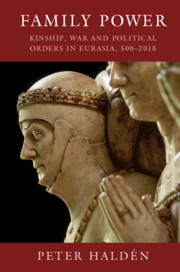Book contents
- Family Power
- Family Power
- Copyright page
- Contents
- Preface and Acknowledgements
- Chronology
- 1 Introduction
- 2 How Social Science Separated Families from Political Order
- 3 Formless Kinship in Formless Polities
- 4 Consolidating Dynasties and Realms
- 5 Strong Aristocracies in Strong States
- 6 The Revival and Sudden Death of Political Kinship
- 7 The Arab Empires c.632–c.900
- 8 Sacred Yet Supple
- 9 The Ubiquitous and Opaque Elites of the Ottoman Empire c.1300–c.1830
- 10 Clans and Dynasties in the Modern Middle East
- 11 Conclusions
- Bibliography
- Index
5 - Strong Aristocracies in Strong States
Europe c.1500–c.1800
Published online by Cambridge University Press: 09 March 2020
- Family Power
- Family Power
- Copyright page
- Contents
- Preface and Acknowledgements
- Chronology
- 1 Introduction
- 2 How Social Science Separated Families from Political Order
- 3 Formless Kinship in Formless Polities
- 4 Consolidating Dynasties and Realms
- 5 Strong Aristocracies in Strong States
- 6 The Revival and Sudden Death of Political Kinship
- 7 The Arab Empires c.632–c.900
- 8 Sacred Yet Supple
- 9 The Ubiquitous and Opaque Elites of the Ottoman Empire c.1300–c.1830
- 10 Clans and Dynasties in the Modern Middle East
- 11 Conclusions
- Bibliography
- Index
Summary
Political scientists and historians generally consider the early modern period as the era when sovereign states appeared. Older scholarship has associated state growth with the obsolescence and defeat of the aristocracy. However, the nobility remained fundamental to the political system despite the establishment of bureaucracies and standing armies. Although the period saw a number of rebellions by nobles, kings and nobles continued to depend on each other. Far from being opposed to royal order the nobility complemented the rule of kings. Although the nobility adapted to growing state structures, this period strengthens the connection between formalization of elite families and the formalization of political institutions. This chapter shows how international politics was also dynastic politics. The internal wars of succession of the Middle Ages became international wars of succession. The chapter maps different forms of succession and their corresponding wars.
Keywords
- Type
- Chapter
- Information
- Family PowerKinship, War and Political Orders in Eurasia, 500–2018, pp. 132 - 174Publisher: Cambridge University PressPrint publication year: 2020



